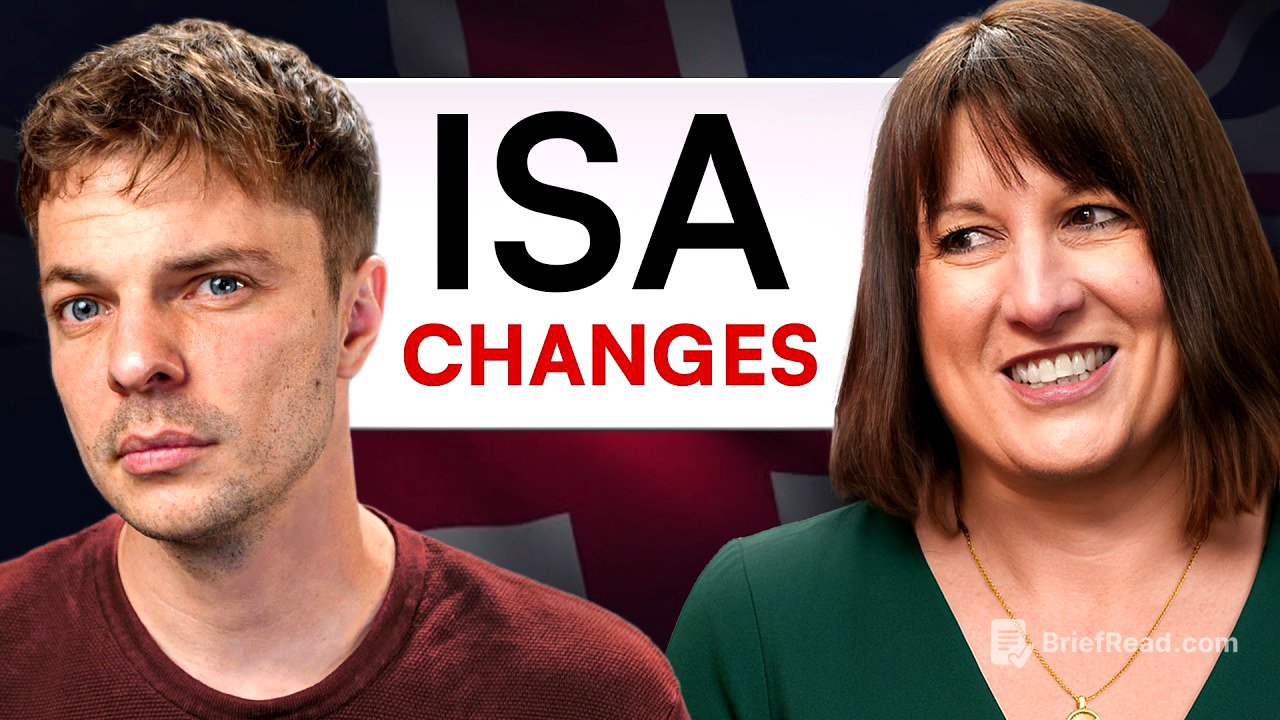TLDR;
The video discusses potential reforms to Individual Savings Accounts (ISAs) being considered by Rachel Reeves, focusing on reducing the cash ISA limit and incentivizing investment in the UK stock market. It examines the motivations behind these potential changes, including the desire to encourage more people to invest in stocks and shares and to boost the UK stock market. The video argues that reducing the cash ISA limit could negatively impact those who rely on cash savings, particularly retirees, and may simply increase tax revenue rather than encourage investment. It also suggests alternative approaches, such as financial education and removing stamp duty on UK shares, to promote investment more effectively.
- Potential reforms to ISAs being considered by Rachel Reeves.
- Motivations behind these changes, including encouraging investment in stocks and shares and boosting the UK stock market.
- Reducing the cash ISA limit could negatively impact those who rely on cash savings.
- Alternative approaches, such as financial education and removing stamp duty on UK shares, to promote investment more effectively.
Introduction: Rumored ISA Changes [0:00]
The video addresses rumors about potential changes to Individual Savings Accounts (ISAs) being considered by Rachel Reeves. While cautioning against acting on speculation, the video acknowledges that these rumors seem to have substance and might be addressed in upcoming financial announcements. The discussion aims to examine these rumored changes and evaluate their potential impact.
Rumored Changes to ISA Limits and Tax Breaks [0:58]
Rachel Reeves has stated she will not reduce the overall ISA limit of £20,000. However, she may adjust the limits on specific ISA types, such as reducing the cash ISA limit, similar to how the Lifetime ISA has a £4,000 annual cap within the overall allowance. Another rumor suggests restructuring tax breaks to incentivize investment in the UK stock market, potentially requiring a certain portion of ISA portfolios to be invested in UK stocks to qualify for tax benefits.
Motivations Behind Potential ISA Reforms [2:20]
The government is considering these changes because historically, more money has been going into cash ISAs than stocks and shares ISAs, even when interest rates were low. The goal is to encourage people to invest in the stock market, particularly in UK stocks, which are currently undervalued. By reducing the cash ISA limit, policymakers hope to nudge people towards investing, assuming that many do not fully utilize the £20,000 allowance anyway. This could increase demand for UK stocks, making the UK market more attractive to both domestic and international investors.
Potential Negative Impacts of Reducing Cash ISA Limits [4:49]
Reducing the cash ISA limit to £4,000 may negatively affect individuals who rely on cash savings, especially those nearing or in retirement, for whom cash ISAs serve as essential buffers, emergency funds, or a place to store pension drawdown money. Lowering the limit could push these individuals into taxable positions, as they exceed the personal savings allowance (£1,000 for basic rate taxpayers, £500 for higher rate taxpayers, and £0 for additional rate taxpayers). This may not drive people to invest but simply increase tax revenue for HMRC, as people save in cash outside of tax-efficient accounts.
Alternative Approaches to Promote Investment [7:36]
Instead of reducing cash ISA benefits, the government should focus on financial education and simplifying investment products. Many people are unaware of the benefits of the stock market or find it too risky, partly due to the advice gap and the prevalence of predatory financial marketing. Financial literacy should be integrated into the school curriculum, and the government should consider removing stamp duty on UK shares to promote investment in UK companies. It's crucial to ensure that any changes feel like a gain for the public, rather than a loss.
The Importance of Maintaining Trust in Savings Products [11:33]
Changing the rules around long-term savings products like ISAs can erode consumer confidence, similar to the mistrust surrounding pensions due to frequent changes. Maintaining the sanctity and trust in ISAs is essential to encourage people to save for retirement. Policy makers should consider the public's perspective and avoid changes that feel like a forced action.
Simple Ways to Promote Investment [13:36]
To promote investment, the government should launch a nationwide education campaign and integrate financial literacy into the school curriculum. For example, teach compounding returns and inflation within maths lessons and discuss the financial markets within history lessons. Additionally, removing stamp duty on the purchase of UK shares could incentivize investment in UK companies. The key is to ensure that these measures are perceived as beneficial to the public.





![[진중권 칼럼] 상징계, 상상계, 실재계](https://wm-img.halpindev.com/p-briefread_c-10_b-10/urlb/aHR0cHM6Ly9pbWcxLmRhdW1jZG4ubmV0L3RodW1iL1MxMjAweDYzMC8/Zm5hbWU9aHR0cHM6Ly90MS5kYXVtY2RuLm5ldC9uZXdzLzIwMjUxMC8wMi9qb29uZ2FuZy8yMDI1MTAwMjAwMzczODg5MXBtam0uanBn.jpg)



